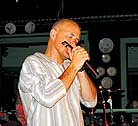Hunter and the Gators … you've seen the name, and probably seen the band. After a number of personnel changes through the years, they recently celebrated their 15-year anniversary with their strongest lineup of talent ever.
Monte Luehlfing has been thumping out bass licks with Hunter since they were junior high school buds (which is more years than either of them care to admit to). Drummer Jon Moorefield played with such regional favorites as Sinamon Leaf and Jobe's Tears before he "Gatored-up." Rick Moreira hails from the New Orleans music scene, and added a major lead guitar and vocal quality to the band after moving here several years ago. The ever-popular "baby Gator" (he will kill me for that), Richard Willis, is impressive on acoustic guitar and takes lead vocals on a number of tunes. Richard was a founding member of the well-received alternative band known as Z (pronounced "Zed") a few years back, but he actually got his "start" in the music business as a roadie for Hunter. He was just this cool, little kid who helped out the band. He started playing guitar, writing, and singing—and seemingly overnight, he got really good at all three.
Last, but far from least, there is Hunter Gibson, a multi-talented man who is so busy I suspect he occasionally meets himself on the highway. He's in constant demand for session work, music editing and jingles. Recently, he flew to New Hampshire to play with Porter Smith on an upcoming CD for East Coast.
With the band's recent 15-year anniversary, and next year marking Hunter's 25th year in the business, one might wonder about their longevity. What makes people want to come out and hear them play week after week, for so many years?
"You have to give the audience what they want—period," Gibson says. "The crowds have changed over the last few years. They're harder to keep happy—more definitive in what they want, and they want to dance!"
Gibson adds that the crowds seemed more laid-back a few years ago, especially with being exposed to more obscure material. "Now, they want familiar songs that bring them to the dance floor. But I think this is a good thing—having crowds that know what they want and expect to get it. It keeps a band from becoming too comfortable—too complacent. It forces you to constantly evolve, without ever really changing who you are or what people have come to expect from you."
The trick here, Gibson says, is planning the set lists carefully so that no matter who's in the crowd, they'll get a healthy dose of what they want to hear, whether it's John Mayer, The Temptations or Toby Keith.
I think the "clicker mentality" kicks in with all aspects of our lives, including what we expect when we go out. The remote control era has given us the power to get the entertainment we want, when we want it, without having to be subjected to anything we don't like. We probably miss out on a lot because of it.
Gibson agrees, and says that having to compete with the astounding technology in home sound systems today forces live musicians to bring the quality of a show up a notch. "You really feel the need to connect with the audience on a personal level," he says. "Whether it's singing a special song for someone, or getting out there and cutting up with the crowd, you want them to feel that connection."
That's a big part of what has kept Hunter and the Gators fresh for all these years. It's what live music has to offer that no sound system can match.
Hunter and the Gators play McB's on Friday, Sept. 29.



Comments
Use the comment form below to begin a discussion about this content.